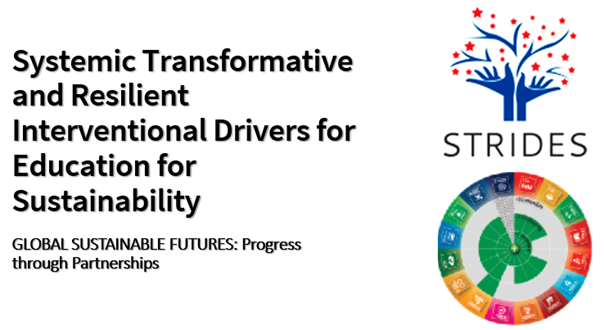STRIDES: Systemic Transformative and Resilient Interventional Drivers for Education for Sustainability
This project calls for meaningful and relevant education for society that is capable of fighting risks of societal unsustainable development, climate change and events such as Covid19 pandemic simultaneously. This will require changes at strategic, tactic and operational levels through integrated all-inclusive bottom-up approaches and application of diverse education systems inherent to communities across the globe Implanting human-centred designs, appropriate technology and cultural dimensions.
This project sets out to describe such an excellence in education: transformational education systems. It is consummation of an international collaborative design process conducted by Global Sustainable Futures – Progress through Partnership Network, which brought together engagement and participation of relevant multidisciplinary team of researchers to frame the problem, design the transdisciplinarity approach (Nicolescu, 1996) and provide a model for an initiative whose aim is to increase the volume of sensitive and complex planetary (considering the interactions between political, cultural, environmental, social, economic components, among others) changes to build sustainable societies (Grandisoli & Jacobi, 2020). It builds on what some of the most advanced scholarly studies conducted by complex systems theory, sustainability, and innovation, and communities working to co-design solutions to integrate SDGs into policies and practices, looking to make its inherent fundamental contribution to the global effort of redesigning education systems.
Given this, this project will attempt to answer several questions about the content and state-of-the-art technology and efficient management of the courses delivered to increase the excellence in educational space that the ‘Education for Sustainable Development’ is calling for:
1. What is the current context of the education systems – at what levels they are today, what level of excellence they need to achieve, and how they can get there – in a way that informs sustainability decisions?
2. What education systems do we need to promote if the goal is not just to educate students and prepare them for jobs but also to enable them as decision-makers to strengthen resilience, social justice, and inclusiveness?
3. How can we identify strategic intervention points that can leverage transformational systemic change?
4. Given that single project (i.e., innovation/change/initiative) does not have the power to change the system, how can portfolio of projects be initiated and managed to impact on the systemic transformation?
5. How can we make systemic transformative and resilient interventions for excellence in education for sustainability more participatory and representative?
6. How can we cultivate a community of decision-makers who self-identify as proactive change agents and take responsibility for the future sustainable education and societal systems?
The perspective offered through this project are critical of how society engages to education and how educators go about managing education systems, including education products and services in the context of delivering and achieving SDGs. Yet what is advocated for is not to overthrow traditional classrooms, pedagogical potentials, or disregard the student voice. However, it is evidence, that most of the education system existing today are impacting adversely on the ecosystem and finite resources, and therefore not only unsustainable for society but also creating conflicting perspectives, and increased disparities among rich and poor in communities causing rapid change and eroding resilience (Glasser, 2018). At the same time, education system is prerequisite for learning how to live well on a planet under pressure and without compromising quality of life for all.
Excellence in educational spaces advances certain ideas that transforms the paradigms of today’s education systems, so possibly enthusiastic educator/education system with the intent and mandate to reform education system, contribute to the long-term sustainability, build a low-carbon, climate-resilient, just, and inclusive society will find this interesting. However, if improve quality of life for all by reducing inequalities building resilience and creating a robust foundation for a flourishing cultural and biological diversity contributing to a wholesome change in a way that we act and rethink of how we relate to one another and how we interact with the ecosystems that support our lives (Glasser, 2018), mainstream excellence in education spaces must follow.
It is not that this will leave the traditional education system behind. This will bring them along, because – as the following section is set out to demonstrate. There is noting in the theory of systemic transformative change that suggests that generation of the data information and knowledge and meaning understanding and wisdom are two mutually exclusive. In fact, excellence in educational spaces holds the promise of attractive returns and transformative change and radical enough to meet the educational responsibilities associated with implementing the ambitious UN sustainable development goals in line with the calls by the UN and UNESCO (Sterling, Glasser, Rieckmann, & Warwick, 2017), while strengthening the capacity of educators fostering meaningful change and aligning our actions with our values and desires to improve quality of life. Currently, this innovative research project called STRIDES: Systemic Transformative and Resilient Interventional Drivers for Education for Sustainability is in progress and we are in Part 1, collecting case studies through a survey questionnaire. You will find the information of PART 0 and PART 1 in the first 3 pages of the survey.
You are invited to contribute to the case studies collection survey link: https://ucem.onlinesurveys.ac.uk/innovative-case-studies-in-education-for-sustainable-devel.
We are developing publications based on Part 0 and Part 1. Get in touch with me (r.thakore@ucem.ac.uk) if you are interested to contribute.
Please find the attached last STRIDES project meeting ppt, transcript and chat. Please watch to the video: https://ucem.zoom.us/rec/share/CWa8ab3-PPURfwiBvJ0kZAaF5tgLc128LADtYiTS0W1oarIIEVfKQ33Zu__CtYvP.ajn6GiSYWdjBXNWv before filling the survey, so that you know how we have proposed to collect case studies through this Part 1.
Also, find podcast link: https://ucem.zoom.us/rec/share/Zv7QUY6RrQAbTv7515OetxtBBooUyabJk5PC3w6ZcH5X7gQXKFpUa7eFkgZF4flQ.eb8jrrSBQXS7DDbB
Alongside, we are working on Methodology section of this project. The next meeting for STRIDES project is on 3rd April 13:00 PM UK time.
External source(s)
Image

Project start date
23/01/2021
Project end date
23/01/2021

